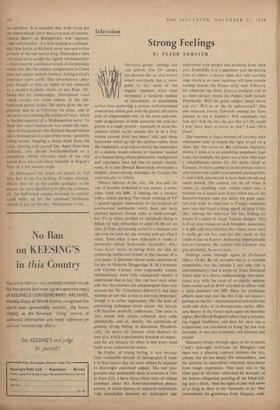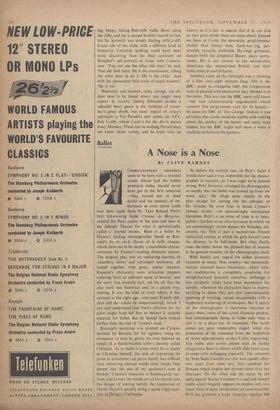Television
Strong Feelings
By PETER FORSTER
OPrsioNs galore; feelings few and seldom. The TV camera has become like an altar before which everybody has a view- point to Jay; most of the regular speakers have even developed a standard manner of incantation, in questioning no less than answering, a precise, well-articulated enunciation which goes with the glazed, off-centre look of teleprompted men. In the news and com- ment programmes of both networks the style has grown to a single pattern—especially in those dis- cussions which tacitly assume this to be a five- minute excerpt from two hours' talk, and those interviews which go for the opinion rather than the credentials, so giving us merely the impressiOn of , a spoken leader-Column or handout instead of a human being whose personality, background and experience have led him to certain conclu- sions.. It is time Donald Baverstock introduced a tougher, closer-mixing technique on Tonight for everyone else to follow.
'Always balance is the aim: the pro and the con, if possible embodied in one person. I some-' times think the BBC is looking for a speaker with a middle parting. The whole working of TV is geared against spontaneity or the eruption of unrehearsed sentiments which have not been checked upstairs. Sound radio is timid enough, but TV is. either terrified of somebody doing a Behan, or only concerned to come off the air on
time. am not naming names it is because you can turn on your set any evening and see what I mean. Even when a new departure is made, it perversely moves backwards. Granada's Who Goes Next? seems to •spring from the idea of presenting intellectual matter in the manner of a quiz game, A Question Master poses questions of the day to Malcolm Muggeridge, R. H. Crossman and Charles Curran, who supposedly answer spontaneously from little soundproof booths. I understand that in fact they can hear each other and that the answers are teleprompted (how else account for Mr. Crossman's delivery?), but then- whether or not this is true is not very, important, though it is rather ingenuously like the kind of advertising technique which claims this bicycle will function perfectly underwater. The point is that, except with actors, rehearsal must stifle spontaneity, and so, usually, the expression of genuine strong feeling in discussion. Paradoxi- cally, the desire for balance often destroys its own aim, which is presumably freedom of expres- sion for all, because its effect is that every road leads to an authoritarian centre.
So display of strong feeling is rare because their reasonable distrust of demagogues (I hope it is that) means that we must seldom be exposed to downright emotional appeal. The one pro- gramme that persistently deals in emotion is This Is Your Life. I have always been wary of risking comment about this American-inspired pheno- menon, in which famous or unknown individuals with remarkable histories are kidnapped and confronted with people and incidents from their past. Essentially it is a peepshow into the private lives of others; it draws upon that odd atavistic urge which at its most harmless will have crowds waiting outside. the Palace early next February (or whenever the Daily E.rpr•ess predicts) and at it.; more sinister means the Podola mob outside Pentonville. Wilt the guest subject break down and cry? Will-he or she be embarrassed? (On one occasion Jimmy Edwards seemed far from pleased to see a brother.) Will somebody not. turn up? And oh, isn't she just like us? Or, could.. I ever have been as brave as that? Look—he's blind!
Our reaction is thus a mixture of curiosity with admiration (and of course the right to put on a show like this turns on Vhe audience reaction);. mostly 1 think it is an ennobling peepshow. Last week, for example, the guest was a man who runs a rehabilitation centre for the newly blind at Torquay. To have cashed in on his priVate victory over misfortune could have seemed contemptible; i. fact I defy anyone not to have been stirred and much moved. The context can be all when it comes to handling such stories—there was a moment on a recent Late Extra when one of the Burton's-window men put down his prop cock- tail and tried to interview a French resistance hero who had faced a firing squad on .what it felt like: viewing the interview felt like finding an emetic in a piece of cheap Turkish Delight. This Is Your• Life makes no such blunders; sometimes it is glib and over-obvious, but I have never seen it really go too far, and for this much of the credit is due to Eamon Andrews's imperturbable tact as compere. He realises that whoever else gets emotional, he never must.
Feelings came through again in Probation Officer (A-R). By all accounts this is a variable proposition, but the episode I saw (the title is self-explanatory) had a script by Tessa Diamond which dealt in a_warm, understanding, non-sensa- tional way with the cases of an elderly spinster baby-stealer and an RAF-retarded ex-officer with a fatal penchant for• HP. How far probation officers look and live like this I do not know— perhaps to the life—but commercial television has made one chary of its documentary claims. (Wit- ness Beatty of the Yard's back again on Saturday nights.) But David Hughes's officer had a convinc- ing rugged kindliness, and here for once was a programme not calculated to bring the law into disrepute. It was also extremely well directed and played.
Humanity broke through again in Sir Kenneth Clark's late-night half-hour on Breughel—and there was a pleasing contrast between the dry, urbane, but no less deeply felt commentary, and the pictures (a marvellous selection) hard-hewn from rough experience. One feels this is the blind man of all time,' remarked Sir Kenneth of the famous allegorical painting of the blind fall- ing into a ditch. 'And the sight of him will move us as long as there is any humanity in us. One remembered the gentleman from Torquay, smil-
ing, happy, taking four-mile walks alone along the cliffs, and for a second hackles started to rise; but Sir Kenneth was simply dealing with a dif- ferent side of the truth, with a different kind of humanity. Certainly, nothing could have been more disarming than his final comment on Breughel's self-portrait of Artist with Connois- seur. 'You can see the other old man,' he said, `that old fool there. He is the connoisseur, telling the artist how to do it. He is the critic.' And with the pleasantest little smile of mock-modesty, 'He is me.'
Humanity and warmth, oddly enough, arc sel- dom now to be found where you might most expect—in variety. Jimmy Edwards exudes a splendid beery gusto in the tradition of yester- day's great drolls, but more typical of today's approach is Val Parnell's new comic on ATV, Roy Castle, whose Castle's On the Air is shown every Monday. There can be nothing Parnell does not know about variety, and he loves what he knows, so it is fair to assume that if he can find no new great drolls there are none about. Instead we have in Castle the new-style, good-humour (rather than funny) man, hard-wol:,ing, per- sonable, versatile, malleable. He sings, grimaces, dances (with the delightful Blairs), plays instru- ments. He is our answer to the second-class American—the second-class British, and their styles meet in mid-Atlantic.
Another event of the fortnight was a showing of a film, sixty-eight minutes long. This is the BBC; made to evangelise staff, the Corporation were so pleased with themselves they showed it to the press. This was not the BBC some will know --the vast administrative organisation which assumes that programmes exist for its benefit— let alone the BBC of 'The George.' Indeed, it was all rather like a look round the stables with nothing about the quality of the horses and many nagS hidden, but the BBC might well show it when it could do no harm to the punters.



























































 Previous page
Previous page